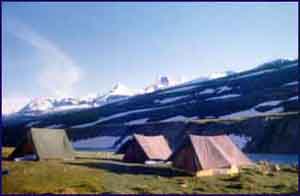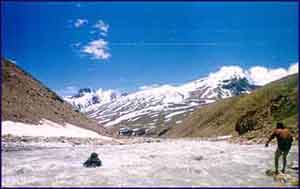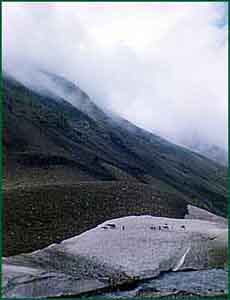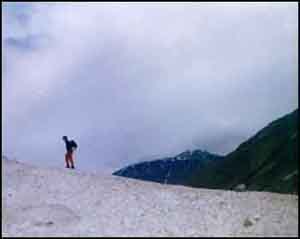| Mountaineering
Trans Himalayan Expedition '98
|
|||||||||||||||
I was en-route to the 'Roof of the World' or 'Little Tibet' or 'World's Coldest Desert' or 'Moonland' or, well... Ladakh has many synonyms. The one I think of is 'The Lost Kingdom'. Living in isolation, this arid region opens up to the world for a mere 4 months in the year. During the other months, Ladakh is under a blanket of snow. Among the highest inhabited places in the world, life here flows with the seasons. An exquisitely cohesive world where peoples lives unfold in tune with the rhythm of nature, it is in harmony with the mighty grandeur of the Himalayan landscape. I had embarked on a Trans Ladakh Expedition crossing the Great Himalayan Range, Zanskar Valley, Central Lahaul, and the Suru Valley. Another 'my type of holiday', I guess. Traversing through the highlands of the Great Himalayan range was a challenge. It was time to test my physical and mental capability and importantly, for a sustained period of over 40 days. It was also a test of my mountain wisdom in forbidding conditions. |
More About Ladakh • Overview
Mountaineering
Adventure
Travelogues | ||||||||||||||
Ladakh is the 'wind zone'. Pitching tents was no simple task, with winds blowing harsh and ferocious, sometimes reaching speeds of 80 miles/hour. Trying to sleep with the constant clutter of the fly sheet. In spite of carefully pegging my tent, I insisted on using the weights of rocks on my guylines. I was in no mood for para-gliding in my sleep! Dehydration happens very fast in this dry belt. Even before you begin to realise it, you could be hit quite suddenly. Maintaining fluid balance in your body is crucial. I was always refilling my bottle along the way, sipping water periodically. My water consumption was around three litres a day. Incidentally, I always carry my 'lucky bottle' for important expeditions which is an 1843 classic piece.
we sent our first man. He was roped. The water level surprised us by reaching his chest level. There was a slip, but he quickly recovered and moved ahead. He made it to the other side of the glacier. So did everyone else, one by one. Soaked from head to toe, I had to change quickly or else the blowing winds would have me chilled to the bone. While in the middle of the river, I felt the sheer force the of water, the timeless power of nature, the fury of this great mountain system.
As we kept marching ahead, gaining more altitude, I began to feel the load of my rucksack. Nights out in the open in the Himalayas are very absorbing. I never miss an opportunity to walk in the darkness and solitude of the mountains. The silence and stillness of the night, the sheer stark blackness of the night, the sequinned skies, the glittering circa of snow peaks, the chill - all create a powerful mental experience. I have never seen quite such a creation of beautiful nights. Sometimes during my sleep, I would wake to the deafening sounds of a loud blast. When the glaciers burst, the valleys echo to the terrifying volumes of sound. It does happen at higher altitudes. Sleep is not the same as it is in the security of your bedroom at home. The eerie desolateness of Ladakh makes it a unique place in the world. Here is a strange and abstract beauty. A place where the desert brown flashes to vivid russets and purples. I could see the colorwash of the softest greys and blues. Some of the waterfalls were simply dramatic, falling off from high cliffs while partly clad in the fine spray of mist in its wake. Not strangely, I kept feeling that most of the rock walls inclined beyond right angles were hanging in precarious balance threatening to crash any moment. The leans were a tremendous visual treat. Some of the peaks seemed so close, yet in reality it is always farther than it seems. Any mountaineer knows that. An undeniable feeling was the awareness of being so insignificant in the face of the gigantic mountains.
The days passed quickly and we were nearing the end of our expedition. My skin had turned dry and flaky. Lips torn, smiling was painful. The wrinkles around my eyes resembled that of Clint Eastwood and my hair felt and looked like stale noodles. My sun burnt nose was the butt of several jokes. So what ? I looked more rugged. Like they say, ' Tough times don't last, tough people do '. Ladakh : a land of stone and ice. Certainly a place like no other on earth. Photo Credit: Somit Doshi
|
|||||||||||||||
Editor: Romola Butalia (c) India Travelogue. All rights reserved. |
|||||||||||||||

 The other side of the Himalayas have plenty of green cover : forests, flowers, soft waterfalls, chirping birds, friendlier atmosphere and prettier terrain. The 'Female Himalayas'. And they control our entire ecosystem.
The other side of the Himalayas have plenty of green cover : forests, flowers, soft waterfalls, chirping birds, friendlier atmosphere and prettier terrain. The 'Female Himalayas'. And they control our entire ecosystem.
 Crossing rivers was not the most pleasant endeavour of the expedition. First, we walk alongside the river, sometimes a couple of kilometres just to try and figure out the 'right' spot to wade across. After all the assessment, eventually we pick up the 'right' area, which is as good as the spot we left two kilometres back. We knew there was only one way to reach the next camp...to cross the mighty waters. The river was turbulent. Keeping balance meant fighting against its force. The water was ice cold, taking even a few seconds longer was risking numbness.
Crossing rivers was not the most pleasant endeavour of the expedition. First, we walk alongside the river, sometimes a couple of kilometres just to try and figure out the 'right' spot to wade across. After all the assessment, eventually we pick up the 'right' area, which is as good as the spot we left two kilometres back. We knew there was only one way to reach the next camp...to cross the mighty waters. The river was turbulent. Keeping balance meant fighting against its force. The water was ice cold, taking even a few seconds longer was risking numbness.
 Crossing glaciers was relatively comfortable, but still offered no margin for error. Vast glaciers with 75 degree inclination and edges winding off into huge straight drops. Every step required intense focused attention. The glaciers surrounded us completely like a large white sheet of nothingness, but for the long oblong crevasses that lay dark and sinister in the snow. For some unquantifiable reason, crunching slowly and precariously in the snow was my idea of 'fun'.
Crossing glaciers was relatively comfortable, but still offered no margin for error. Vast glaciers with 75 degree inclination and edges winding off into huge straight drops. Every step required intense focused attention. The glaciers surrounded us completely like a large white sheet of nothingness, but for the long oblong crevasses that lay dark and sinister in the snow. For some unquantifiable reason, crunching slowly and precariously in the snow was my idea of 'fun'.
 Suddenly, my pace was slowing down and I was running out of breath because of the elevation. The message was clear : the air was getting thinner. We had reached altitudes of 17,000 to 18,000 feet above sea level and it was bound to effect our progress. Luckily, high altitude sickness has always eluded me though it is believed to strike anybody. We did have a few cases of nausea, loss of appetite, insomnia, splitting headaches but fortunately, it was only a short lived debilitation.
Suddenly, my pace was slowing down and I was running out of breath because of the elevation. The message was clear : the air was getting thinner. We had reached altitudes of 17,000 to 18,000 feet above sea level and it was bound to effect our progress. Luckily, high altitude sickness has always eluded me though it is believed to strike anybody. We did have a few cases of nausea, loss of appetite, insomnia, splitting headaches but fortunately, it was only a short lived debilitation.
 There is one glorious life in the Ladakh skies - the magnificent bird, Lammergeyer. Haunting the high inaccessible rocky cliffs of the region, I have seen it soar in the skies with its wings measuring 8 to 9 feet ! It feeds on bones carrying them high in the air to drop them on the rocks to swoop down and pick the marrow. Watching this majestic bird floating in full flight against the clear blue skies is a special treat.
There is one glorious life in the Ladakh skies - the magnificent bird, Lammergeyer. Haunting the high inaccessible rocky cliffs of the region, I have seen it soar in the skies with its wings measuring 8 to 9 feet ! It feeds on bones carrying them high in the air to drop them on the rocks to swoop down and pick the marrow. Watching this majestic bird floating in full flight against the clear blue skies is a special treat.